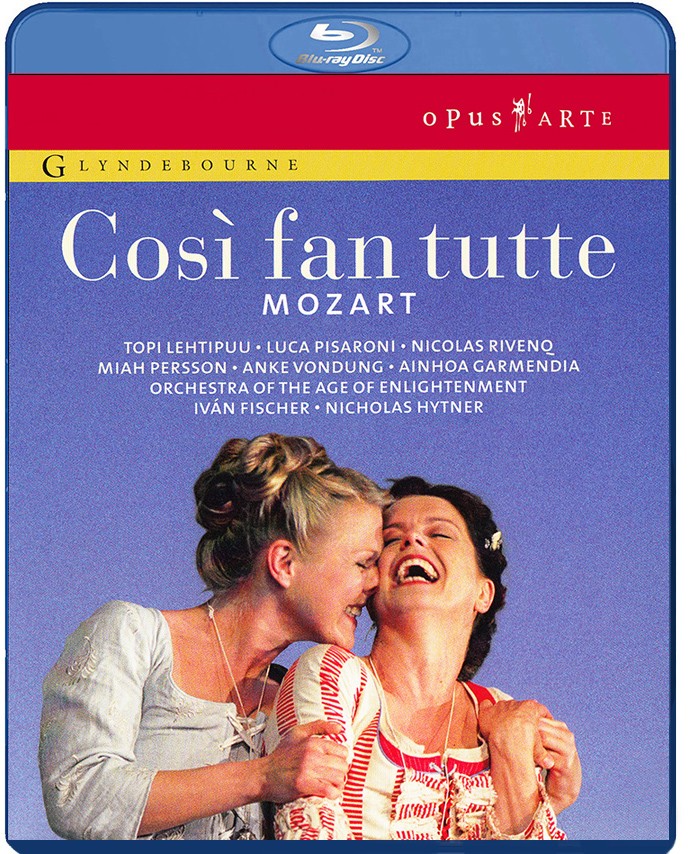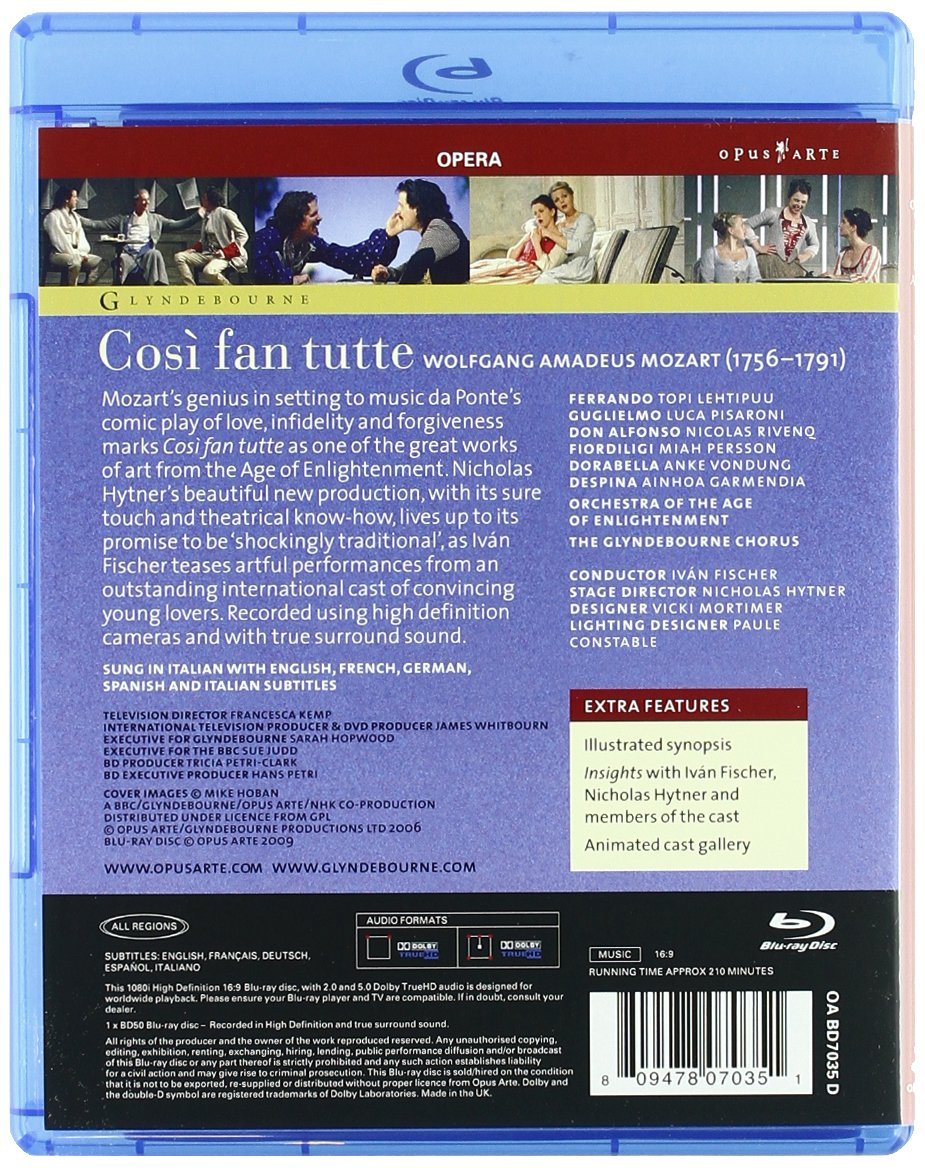

💓 Mozart Così fan tutte opera to libretto by Lorenzo Da Ponte. Directed 2006 by Nicholas Hytner at Glyndebourne. Stars Miah Persson (Fiordiligi), Anke Vondung (Dorabella), Topi Lehtipuu (Ferrando), Luca Pisaroni (Guglielmo), Nicolas Rivenq (Don Alfonso), and Ainhoa Garmendia (Despina). Iván Fisher conducts the Orchestra of the Age of Enlightenment (Leader Margaret Faultless) and the Glyndebourne Chorus (Chorus Master Thomas Blunt). Pianoforte continuo: Jonathan Hinden; cello continuo: Sebastian Comberti. Designs by Vicki Mortimer; lighting by Paule Constable. Directed for TV by Francesca Kemp; produced by Tricia Petri-Clark and Hans Petri. Sung in Italian. Released 2009, disc has 5.0 Dolby TrueHD sound. Grade: A+
This sublime production with its stellar cast and orchestra was loved by all as a DVD, and now it's even better in HDVD. Così fan tutte, with its hilarious situations, sad truths, and glorious music, is on every list of the greatest operas. So if you bought just one Blu-ray opera to try out on your HT, this disc would be probably be a good bet. It would be pretentious for me to run on saying good thing about this, so let's just go to some screenshots.
Don Alfonso (Nicolas Rivenq), an older and wiser man, is having coffee with two young army officers, Ferrando (Topi Lehtipuu) and Guglielmo (Luca Pisaroni), who are engage to beautiful sisters. The young men brag about the faithfulness of their sweethearts. Don Alfonso challenges their assertions and makes them a bet:
The young officers fecklessly agree to follow Don Alfonso in testing the girls. Now we meet the sisters as Don Alfonso breaks the (false) news to them that Ferrando and Guglielmo have been called immediately to a battlefield. The blond is Fiordiligi (Miah Persson), engaged to Guglielmo, and the brunette is Dorabella (Anke Vondung), engaged to Ferrando:
To some of Mozart's most exquisitely tender music, the girls say their farewells to their foolish men. Here we see Guglielmo and Fiordiligi:
The men go off to war. Now we meet Despina (Ainhoa Garmendia) the maid, who is in cahoots with Don Alfonso. Despina tells the girls to cheer up and take advantage of the new situation:
With the help of Despina, Ferrando and Guglielmo appear in disguise as foreign nobles who want to court the girls (Ferrando is on his knees). Disguise tricks were a staple of comedy in past centuries. Because this production is set "in the past," the gimmick still works, and you accept as plausible that the girls don't recognizes their boyfriends:
Don Alfonso keeps the test going:
But Fiordiligi delivers her famous area "Como scoglio" or "Like a rock" in which she declares her loyalty to her boyfriend:
Despina will share in Don Alfonso's prize if he wins the bet. She keeps working on the girls:
After several funny plot twists, the girls agree to at least give in just a little to the these ardent and comely suitors. But the plot thickens when Fiordiligi picks the wrong guy in disguise!
Suddenly the stakes in the bet have gone much higher than the young officers ever intended. They should stop the game now, but they have promised to follow the orders of Don Alfonso as part of the bet:
Guglielmo seduces the wrong girl:
Fiordiligi is a more serious girl than her fun-loving sister, who was pretty quick to fall. The climax of the opera is Fiordiligi's rondo, "Per pieta, ben mio, perdona". She's in anguish: she's falling too, and she doesn't think she can stop it:
Now it's Ferrando's time to score:
Immediately there's a wedding feast:
But before the vows can be exchanged, martial music signals that the war is over and the troops are coming home! The foreign princes hide. They then appear again in their officer uniforms:
Don Alfonso has won his bet. But now he must earn his ill-gotten pay by making a speech good enough to get everybody back into a better mood:
H'm. I guess there's a nugget of wisdom here for all. It's in the nature of a woman to love, and in the nature of a man to lie. The title of this opera means "So Act All Women." But Mozart and Da Ponte here target the men, not the girls, since no gentleman would ever could ever try to lead a woman, or at least not his own woman, into temptation. The fault of the men is far worse than that of the girls, and everybody has something to forgive of the others.
All this heavy stuff is handled by Mozart and Da Ponte is a light-hearted way as a comic drama (dramma giocoso). The directing, singing, and acting keep you laughing all the time. There's a true story in one of the extras about a married couple who were thinking of splitting (probably because of an infidelity). But after they saw Così fan tutte and came out of the theater laughing, they reconciled. Mozart made sure his audience got their money's worth.
OR


















